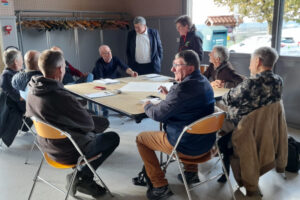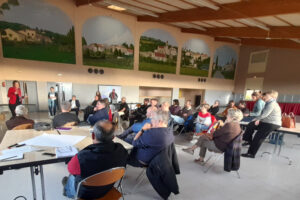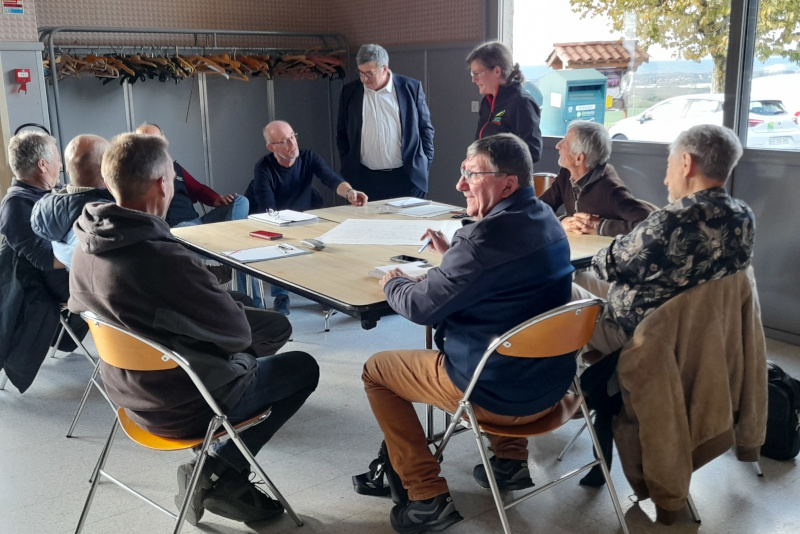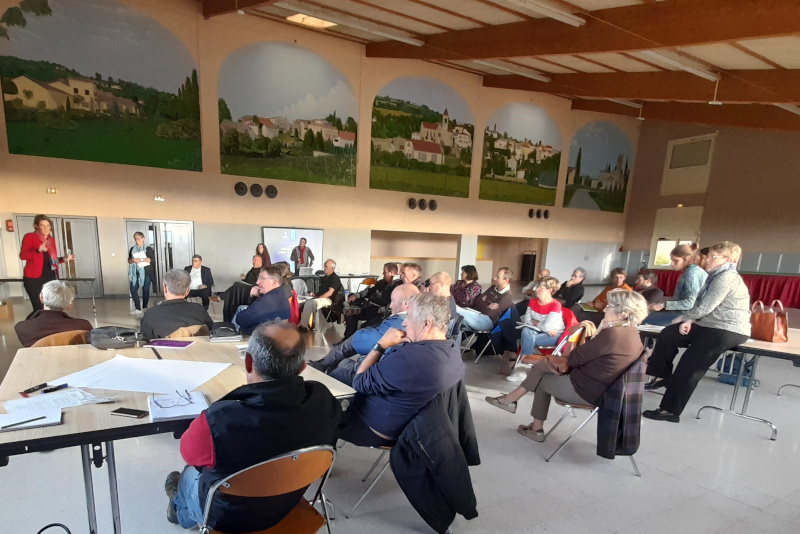Faced with this demographic challenge, the Pléiades project is looking at the renewal of entrepreneurial dynamics in the agricultural sector and aims to develop solutions together with agriculture and food systems stakeholders. It is a research action project, which means objectives and methods are discussed and implemented with partners.
The results of the 2020 general agricultural census highlight major changes in French agriculture. Half of French farmers will retire by 2030. Family employment is gradually declining, replaced by permanent or seasonal employees. The share of corporate farming continues to grow.
Faced with this demographic challenge, the Pléiades project is looking at the renewal of entrepreneurial dynamics in the agricultural sector and aims to develop solutions together with agriculture and food systems stakeholders. It is a research action project, which means objectives and methods are discussed and implemented with partners.
In 2022, the initial phase of the project involved an examination of changes and innovations in terms of access to land and financing, individual trajectories and forms of collective organisation.
In the second phase of the project, action-research is being conducted in the dairy and fruit-growing sectors, where generational renewal raises the issue of raw material supply.
In the dairy sector, the attractiveness of the profession is at stake. An analysis of the career paths of “atypical” profiles, in particular women and non-family members who have set up in the long production chain, raises questions about motivations and factors contributing to job satisfaction (Courret, 2023).
The issue of renewal also arises specifically in the arboricultural sector, which is characterised by long payback periods, complex technical skills that are exposed to climatic and phytosanitary risks, and the use of permanent and temporary salaried labour. A technical-economic analysis was carried out using the agrarian diagnosis method in the mid-Rhône valley to establish a modelisation of farm systems and conditions to pursue fruit production activity (Couzon and Hebert, 2023).These studies highlight the need for greater recognition of the profession, both financially and socially, within the value chain and in the regions. They also reveal the importance of professional collectives for pooling resources and giving meaning to work.


Methodological approaches
The project is divided into two phases, each employing an action research approach. The first phase involves an examination of the changes occurring in entrepreneurial renewal within the agricultural sector. This examination encompasses three key areas:
- Characterize changes and weak signals;
- Evaluate the challenges and needs to support generational renewal in agriculture
- Identifying and analyzing innovative forms and strategies.
This first phase was conducted using the following methods:
- Qualitative interviews were conducted with 25 stakeholders, including representatives from professional agricultural organisations, agricultural training institutions, rural development organisations and value-chain stakeholders. The objective of these interviews was to gain an understanding of the challenges and needs facing the sector as perceived by these stakeholders.
- The analysis of agricultural statistics was conducted in order to gain an overview of the regional situation.
- The identification of emerging support mechanisms for agricultural entrepreneurship, including financing and land.
- Analysis of 10 “innovative” farms
The second phase of the project is focused on action research in the dairy and fruit value chains, which are characterised by a low rate of generational renewal. This raises questions about the supply of raw materials.
In the dairy sector, the attractiveness of the profession is at stake, so researchers and partners have opted for a sociological approach. An analysis was carried out of the installation trajectories of “atypical” profiles, in particular women and non-family members who had set up in the long chain, focusing more specifically on motivations, individual and collective resources mobilised during the installation and factors contributing to job satisfaction (Courret, 2023). The study was based on 20 in-depth qualitative interviews.In the arboricultural sector, researchers and partners sought to characterise the various models of arboricultural farms and the conditions for their renewal. A technical-economic analysis was conducted utilising the agrarian diagnosis method in the mid-Rhône valley, situated between Auberives-sur-Varèze and Tain l’Hermitage (Couzon and Hebert, 2023). This study is based on 73 technical-economic interviews conducted with retired or active farmers and six semi-directive interviews with local and industry stakeholders.
Key results
The work carried out in the dairy industry demonstrates that settlement in agriculture is a succession of trials and tribulations, whether you come from a farming background or not. Farmers have to deal with the previous farmer, with the other associates or employees involved in the day-to-day organization of work, the local professional group, the dairy and other local players. The study reveals the need to nuance the categories “from farming background” or not and to challenge gender stereotypes.
The issue of renewal also arises specifically in the arboricultural sector, which is characterised by long payback periods, complex technical control and exposure to climatic and phytosanitary risks, and the use of permanent and temporary salaried labour. Three main models of arboricultural farms can be distinguished by their size, the amount of capital required to take them over, and the commercialisation processes and value-chains. Several levers to enhance farming settlement have been identified and discussed with farmers and local players in terms of access to capital, production value enhancement and pooling (Couzon and Hebert, 2023).These studies demonstrate the necessity for greater recognition of their work for farmers, both financially and socially, within the value chain and at the local level. Furthermore, they illustrate the significance of professional collectives for pooling resources (e.g. equipment, machinery, irrigation infrastructure, and accommodation for temporary labour in arboriculture) and for providing meaning to work. New types of collective farms are emerging, which are also renewing the relationship with the profession and with capital, and experimenting with new legal forms.
Project team
Perrine Vandenbroucke, Hélène Brives, Carole Chazoule, Stéphanie Tabaï et Jérôme Zlatoff
Publications
Project website: Projet Pléiades – Terra Isara
Laure Courret, Hélène Brives, Perrine Vandenbroucke, Claire Delfosse, Trouver à la place en élevage bovin lait : étude de vingt trajectoires d’installation dans le Rhône et la Loire, Colloque SFER Les exploitations agricoles et les métiers en agriculture : Évolutions, transformations, perspectives, Angers, 6-7 juin 2024
Eugénie Couzon, Alexandra Hébert, Nicolas Brulard, Olivier Ducourtieux, Perrine Vandenbroucke, Perspectives de renouvellement des exploitations en arboriculture dans la moyenne vallée du Rhône, Colloque SFER Les exploitations agricoles et les métiers en agriculture : Évolutions, transformations, perspectives, Angers, 6-7 juin 2024
Hélène Brives, Mathilde Grau, Caroline Mazaud. Faire du “bon travail” en collectif : l’exemple des Cuma. In Construire, perdre, retrouver le sens du travail en agriculture coordonné par Philippe Spoljar, Lucie Dupré, Caroline Depoudent, éditions Educagri. https://www.calameo.com/agrosupdijon/books/0007130573868f384678d
Vandenbroucke P. (2015) « L’exploitation familiale et son rapport au territoire de 1960 à aujourd’hui », Bulletin de l’Association des Géographes Français, Vol.3, 306–321. https://journals.openedition.org/bagf/675
Cécile Praly, Carole Chazoule, Claire Delfosse, Jean Pluvinage. SYAL et relocalisation des agricultures européennes : Une application à l’arboriculture de la Moyenne Vallée du Rhône. Economies et Sociétés. Série AG Systèmes agroalimentaires, 2007, 29, pp.1547-1565. https://www.persee.fr/doc/esag_2275-2919_2007_num_41_929_936
Dynamique des structures agraires hongroises. Quels profils d’exploitation se dessinent ? Perrine Vandenbroucke , Istvan Feher ; Economie Rurale, 2011, 5-6 (325-326), pp. 100-113 https://www.cairn.info/revue-economie-rurale-2011-5-page-100.htm
Molnár A. et Vandenbroucke P., 2010. Structural and land use change of farms in the periurban area of Budapest _ Case study of Veresegyhàz subregion, Studies in Agricultural Economics, AKII, vol. 112, pp. 83-96. https://ageconsearch.umn.edu/record/93124/



